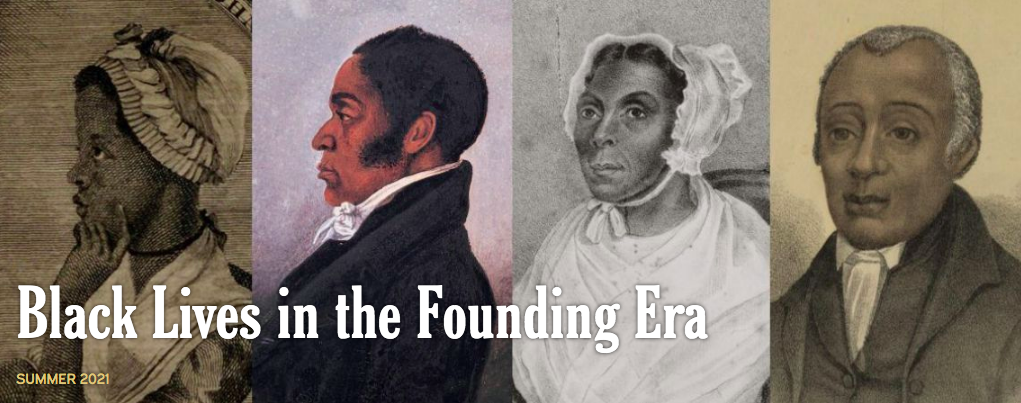Presenting the 60th Issue of History Now, Black Lives in the Founding Era
Posted by Gilder Lehrman Staff on Tuesday, 05/18/2021
History Now is the online journal of the Gilder Lehrman Institute. Each issue features original essays by renowned historians on key topics and eras in American history.
A one-year, $25 subscription includes access to the three new issues published annually and full access to the back catalogue of History Now, featuring hundreds of essays by leading US history scholars. Subscribe here.
Teachers registered in our Affiliate School Program can sign up for a free subscription to History Now. Learn more here.
Issue 60 of History Now includes a record sixteen essays on the contributions of eighteenth and early nineteenth-century African American men and women whose extraordinary life stories transform our understanding of American history. It is part of the Institute’s on-going Black Lives in the Founding Era initiative, which restores to view the lives and works of a wide array of African Americans in the period 1760 to 1800.
Edited by Carol Berkin, Presidential Professor of History, CUNY, essays include
“The Development of Slavery in the Early Modern Atlantic World” by Michael Guasco, Chair and Professor of History, Davidson College
“The Great Negro Plot of 1741” by Thomas J. Davis, Emeritus Professor of History, Arizona State University, Tempe
“Recovering Voices of the Enslaved in Colonial America” by Sophie White, Professor of American Studies, University of Notre Dame, and winner of the 2020 Frederick Douglass Book Prize
“Phillis Wheatley, a ‘Genius in Bondage’” by Vincent Carretta, Emeritus Professor of English, University of Maryland
“African American Patriots in the Revolution” by Judith Van Buskirk, Professor of History, State University of New York, Cortland
“Phillis Wheatley: Poet Laureate of the American Revolution” by James G. Basker, Richard Gilder Professor of Literary History, Barnard College, Columbia University, and President of the Gilder Lehrman Institute of American History
“James Forten and American Freedom” by Julie Winch, Professor of History, University of Massachusetts Boston
“African Americans in Exile after the American Revolution” by Graham Russell Gao Hodges, George Dorland Langdon Jr. Professor of History and Africana & Latin American Studies, Colgate University
“Scipio Handley’s Great Escape” by Robert Olwell, Associate Professor of History, University of Texas at Austin
“Mutual Assistance: Building Black Community Life in Freedom” by Lois E. Horton, Professor of History Emerita, George Mason University
“Olaudah Equiano, or Gustavus Vassa, a Self-Made Man” by Vincent Carretta, Emeritus Professor of English, University of Maryland
“Sally Hemings: Given Her Time” by Jon Kukla, Author and Distinguished Lecturer for the Organization of American Historians
“Freedom, Slavery, and War in Virginia” by Alan Taylor, Thomas Jefferson Foundation Chair, Corcoran Department of History, University of Virginia, and winner of the 2014 Pulitzer Prize for History
“Richard Allen, Jarena Lee, and the Second Great Awakening” by Margaret Washington, Marie Underhill Noll Professor of American History, Cornell University
“African Americans and the Making of Liberia” by Claude A. Clegg III, Lyle V. Jones Distinguished Professor of History, University of North Carolina at Chapel Hill
“Avoiding the Trap of Whitewashing the Founding Era: Teaching Black Liberation during the American Revolution” by Alysha Butler-Arnold, Social studies Teacher, McKinley Technology High School in Washington, DC, and 2019 National History Teacher of the Year
In addition to these outstanding essays, the issue includes a special feature: a video of a reading by Renée Elise Goldsberry and other Hamilton cast members of a 1777 freedom petition by enslaved African Americans in Boston, which could be seen as the origin of the Civil Rights Movement in America as it is the first petition to assert equal rights for African Americans based on the principles of the Declaration of Independence.
